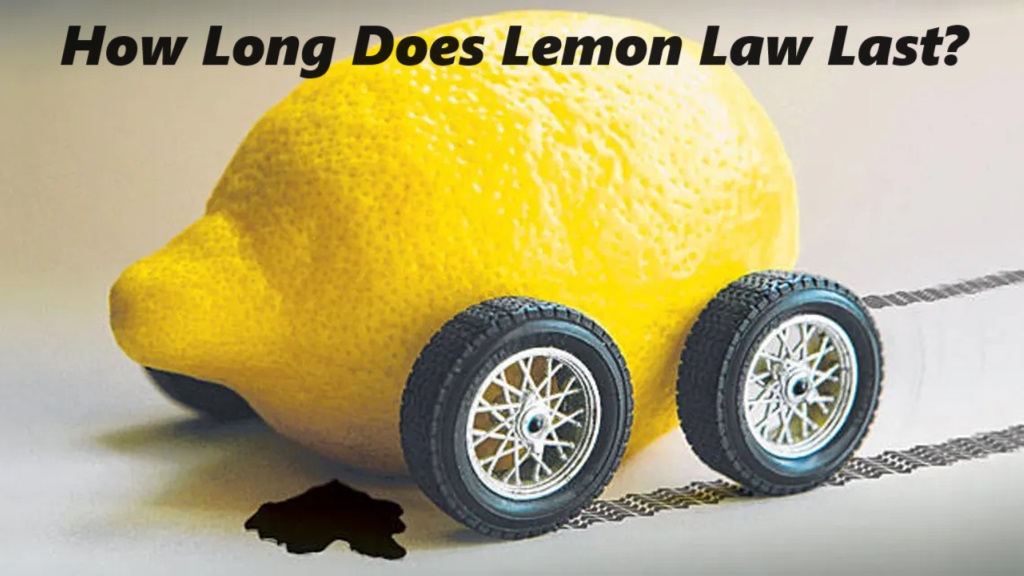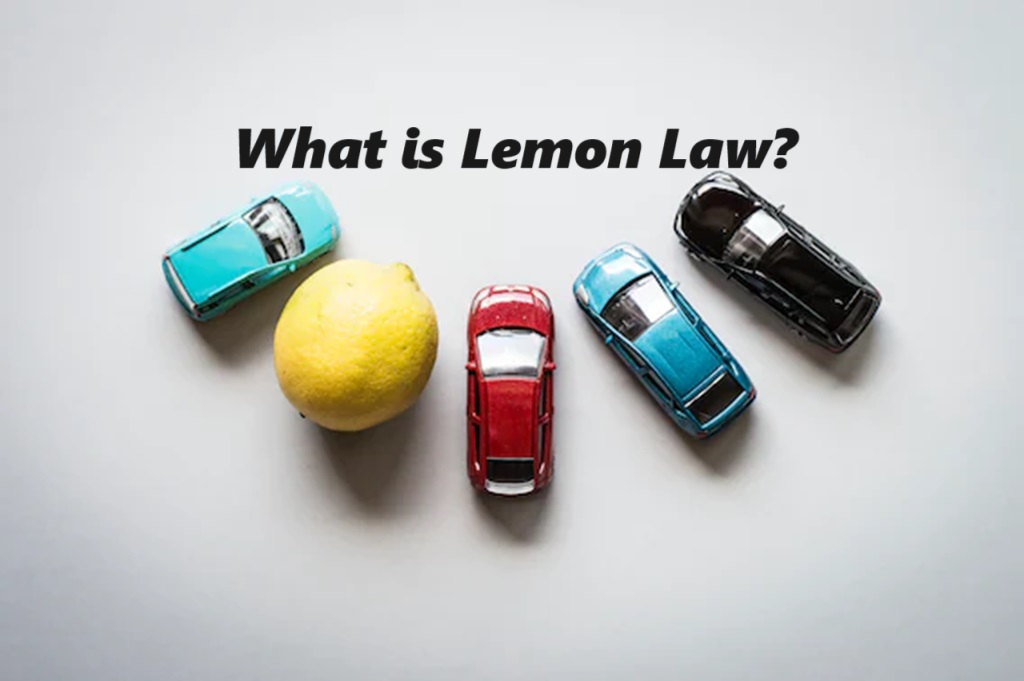
27 Jan How Long Does Lemon Law Last?
Purchasing a brand-new car should be an exciting experience. After test drives, negotiations, and paperwork, you finally drive your shiny new vehicle off the lot. However, the initial thrill can quickly turn to frustration if your new car has persistent mechanical issues. This is where lemon laws can help protect car buyers. But how long does lemon law last?
What is Lemon Law?

Lemon laws offer legal recourse for consumers who purchase defective new vehicles that the manufacturer is unable to repair within a reasonable number of attempts. Lemon laws vary by state, but generally provide consumers with options such as a replacement vehicle or refund.
The exact criteria to qualify under lemon law differs by location. But in most states, it requires:
- A reasonable number of repair attempts for the same defect
- The defect continues to substantially impair the vehicle’s use, value, or safety
- The issues typically occur within the first 1-2 years or 18,000-24,000 miles after delivery
Lemon laws protect new car buyers if the dealer or manufacturer can’t permanently fix a substantial defect after multiple repair attempts. Some used vehicles may also qualify, depending on your state’s lemon law.
Lemon Law Coverage Periods
The lemon law rights period, or statute of limitations, sets a time limit on how long after purchasing a defective vehicle you can file a lemon law claim. This coverage window varies by state, with most falling in the range of 12 months to 2 years after the original delivery date.
Some key lemon law coverage periods by state include:
- California – 3 years or 36,000 miles, whichever comes first
- Florida – 2 years or 24,000 miles
- New York – 2 years or 18,000 miles
- Texas – 2 years or 24,000 miles
- Washington – 2 years or 24,000 miles
So in most states, lemon law coverage lasts somewhere between 1-2 years or up to around 24,000 miles put on the odometer. This gives consumers a reasonable window to identify defects and resolve issues under lemon law if the dealer or manufacturer can’t permanently correct them.
A few states do extend lemon law rights longer, up to 3-5 years for major powertrain components like the engine or transmission in some cases. But the coverage windows above are most typical.
When the Lemon Law Clock Starts
A key question with lemon laws is when does the coverage period start? In most states, the lemon law timeline begins on the original delivery date for that specific vehicle.
For example, if you purchased a new 2022 Honda Civic on February 1, 2022, then the one or two-year lemon law coverage for that particular car would start on February 1, 2022.
The original delivery or purchase date, not the vehicle’s model year, determines the beginning of your eligibility period under lemon law. Your lemon law rights expire once you pass the time or mileage limit set by your state after that original purchase date.
Some exceptions exist, such as if there are delays in actually receiving delivery of your vehicle after purchase. Talk to a lemon law attorney to understand exactly when coverage takes effect for your specific situation. But in most cases, the lemon law clock starts ticking on the day you first take delivery of the new car.
Stopping the Lemon Law Clock
What if you purchase a new car but then need to spend weeks or months waiting as the dealer attempts repairs? This repair time doesn’t count against your lemon law rights.
Most states “stop the clock” on the lemon law timeframe while the vehicle is in the possession of the manufacturer or authorized repair facility. Time spent waiting for repairs, in the shop being diagnosed, or waiting for backordered parts pauses the lemon law coverage period.
The lemon law eligibility resumes only after you get the repaired car back from the dealer and have a reasonable chance to detect whether or not the defect has been fixed.
This prevents the lemon law coverage from expiring while you wait through multiple repair attempts trying to give the manufacturer a chance to correct the issue. Consult your state laws or a lemon law attorney for specifics on stoppages in your location.
Reporting Time Limits
While most states give 12-24 months of lemon law coverage from the purchase date, some also specify shorter time limits to report defects or file claims after the issues arise.
For example, Michigan’s lemon law provides coverage for 1 year or 12,000 miles. But once a problem occurs, you only have 30 days to notify the manufacturer of the defect in writing. Other states give 3-6 months after the issue arises to send notifications and file claims.
Review the reporting and claim filing deadlines in your state’s lemon law statutes. While the overall coverage window spans 1-2 years in most states, waiting too long after a defect appears can impact your eligibility despite still being within the overall lemon law period.
Leased Vehicle Lemon Laws
What about leased vehicles? The same lemon law protections apply, but the coverage expiration becomes linked to the lease term rather than a set period of months or miles from the purchase date.
If the defect arises within the lease period, lemon law still provides recourse even if the time since original delivery exceeds the state’s normal 12 or 24 month coverage window.
For example, New York’s lemon law rights expire after two years for purchased vehicles. But for leased vehicles, consumers maintain eligibility throughout the entire lease period regardless of its length. So lemon law can still apply even if problems arise in year 3 or 4 of a long-term lease.
Consult an attorney for guidance about leased vehicle lemon law time limits in your state. But in general, lemon law still protects you if substantial defects occur at any point during your lease provided the manufacturer can’t permanently fix them after multiple attempts.
Extended Warranties and Lemon Laws
Many new vehicles now come with longer manufacturer warranties promising 5 years/60,000 miles or even 10 years/100,000 miles of protection. But having an extended warranty doesn’t necessarily prolong your lemon law rights.
The lemon law eligibility period still depends on state statutes, not the warranty terms. An extended 5 year warranty doesn’t grant you 5 years of lemon law coverage if your state only provides 2 years by default.
That said, having an extended repair warranty can provide additional time for the dealer to attempt fixes before lemon law becomes necessary. If you do end up filing a lemon law claim, strong warranty coverage also improves the value you can recoup.
So while extended warranties don’t directly extend lemon law protections, their expanded repair coverage can provide more time to resolve issues before turning to lemon law recourse options.

Used Car Lemon Laws
Used cars aren’t new, so they aren’t covered under standard lemon laws, right? Not quite. Many states provide at least some level of lemon law protection for used car buyers, often called “Lemon Law – Type Coverage”.
Exact used car lemon law qualifications differ by state. Some examples:
- California – Covers used vehicles during the 1 year/12,000 mile warranty period
- New Jersey – Used cars are covered during the first 2 years or 24,000 miles after sale
- Ohio – Used lemon law protection lasts 1 year or 12,000 miles
Coverage windows are shorter for used vehicles and repairs may need to be handled through third-party extended warranty companies. But over half of states offer at least limited lemon-like protections for used car buyers.
Review your state’s used car lemon laws or consult an attorney to understand your rights if you purchased a used vehicle that turns out defective. While not as strong as new car lemon law rights, important protections may still apply.
Lemon Law Buyback Impacts
What happens if you go through the full lemon law process and the manufacturer ends up buying back the defective vehicle? How does this impact the coverage period for your next new car purchase?
In most states, buying back a lemon vehicle does not reset or extend your lemon law rights for future purchases. The coverage windows are based on each individual vehicle’s original delivery date, not your personal purchase history.
However, a small number of states do provide extra protections if you buy another new vehicle from the same manufacturer that previously bought back your lemon. For example:
- Connecticut: 4-year coverage period if manufacturer has already repurchased your vehicle
- Kentucky: 5-year coverage if you purchased another vehicle from repurchasing manufacturer
Check if your state has any special allowances in these situations. But in general, lemon law coverage remains linked to each new vehicle independently, not your personal purchase timeline.
Lemon Law Coverage Loopholes
While lemon laws provide important consumer protections, be aware of some potential loopholes and exclusions manufacturers or dealers may cite to avoid lemon law claims:
- Minor defects that don’t substantially impair use, value, or safety
- Unauthorized repairs or modifications made after purchase
- Issues caused by collision, damage, or abuse
- Normal maintenance items like brake pads, tires, alignments
- Problems arising after lemon law period expires
Manufacturers may try to categorize a defect as “minor” or blame it on driver error to avoid buybacks. Make sure authorized technicians thoroughly document all defects and repair attempts. Consult an attorney if manufacturer alleges your issues don’t qualify or fall outside lemon law coverage windows.
Consulting a Lemon Law Attorney
The ins and outs of lemon laws can be confusing for consumers. An experienced lemon law attorney can be invaluable in reviewing your case details and determining if your situation qualifies under your state’s lemon law.
They also handle all negotiations with the manufacturer if your vehicle does meet the lemon law criteria. This takes the stress off you as the consumer so you can get the best resolution, whether that’s a replacement vehicle, buyback, or cash compensation.
Most reputable lemon law firms work on a contingency fee basis, meaning you pay nothing upfront and they receive compensation only if you’re awarded a settlement. There’s no risk in at least consulting with a lemon lawyer to understand your rights and options.
Am I Too Late for Lemon Law?
Wondering if you’ve missed your chance to pursue lemon law protections? Here are some key factors in determining if you still have a shot at a lemon law claim:
- Purchase date – Do you fall within the time limit set by your state’s lemon law from the vehicle’s original delivery date?
- Mileage – Have you exceeded your state’s lemon law mileage limit, such as 24,000 or 36,000 miles?
- Notification – Did you notify the manufacturer of the defect in writing within your state’s required timeframe after the issue arose?
- Repair attempts – Can you document a reasonable number of qualified repair attempts as defined by your state’s lemon law?
- Substantial impairment – Does the defect still substantially impair the vehicle’s safety or value after multiple repair attempts?
If the answer to those questions is yes, there’s a good chance you still have a viable claim under your state’s lemon law. An experienced lemon law lawyer can review the specifics and advise if it makes sense to proceed with a claim or negotiate a settlement.
Don’t just assume you’re out of luck if you’ve owned the car for 2+ years or put on a lot of mileage. There are still possibilities to explore if the vehicle suffers from serious, unfixable defects. Consult a qualified attorney to discuss your rights even if your ownership period exceeds common lemon law time limits.
Conclusion
Lemon laws provide important protections if you purchase a seriously defective new vehicle that the dealer and manufacturer can’t permanently repair. While lemon law coverage windows vary by state, they generally fall in the 1-2 year or 12,000-24,000 mile range after original delivery.
Carefully document repair attempts and notify the manufacturer promptly when defects arise. Understanding vehicle maintenance law is crucial for car owners; rights and responsibilities vary, so consult an attorney to determine if your situation qualifies under your state’s lemon law protections. With persistence and the right legal guidance, you can get the just resolution you deserve – whether that’s a refund, replacement car, or cash compensation.
Don’t assume you’re automatically out of luck if your vehicle’s issues arise later or exceed common lemon law time limits. An experienced lemon law attorney can still help you explore options and negotiate a satisfactory outcome.
Frequently Asked Questions
Q: Can I still qualify for lemon law after my car warranty expires?
A: Possibly, as lemon laws operate independently from the manufacturer’s repair warranty. The key factors are whether you are still within the time and mileage limits defined in your state’s lemon law statutes, not whether the defect arose during the warranty coverage period.
Q: How many days does a dealer have to fix a car under lemon law?
A: Lemon laws don’t define a specific number of days for repairs. But if the vehicle spends an excessive number of cumulative days in the shop undergoing diagnosis or repairs, this can help demonstrate it qualifies as a lemon.
Q: Can I get a lawyer after I sign the lemon law buyback papers?
A: Retaining a lemon law attorney before signing any buyback or settlement agreement is best to ensure you maximize your recovery. However, you may still be able consult an attorney after signing a buyback for a review of options moving forward.
Q: What is the success rate of lemon law cases?
A: Experienced lemon law firms report a 60-80% success rate resolving client cases through settlements or lawsuits. Thorough documentation and having a qualified lawyer demonstrate your situation meets the lemon law criteria are key to a successful outcome.
Q: How much money can I get from a lemon law case?
A: Compensation depends on factors like your state’s statutes, vehicle price, and mileage at the time of settlement. But most consumers recover $15,000-$40,000 in either cash compensation, vehicle refund, or equivalent value replacement car.


No Comments